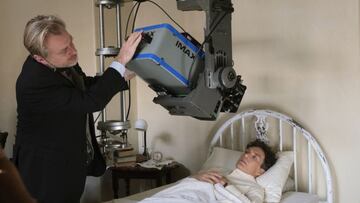Nolan reveals that Oppenheimer’s most controversial scene was improvised
The director confesses that the sequence in which he talks about dropping the atomic bomb on Kyoto was improvised by the actor.

There is a very specific scene in Oppenheimer that provokes a divide in opinion. Some are amused, others are alarmed. It is the sequence in which James Remar plays Henry Stimson, the Secretary of State who refused to drop the bomb on Kyoto. In the movie, Stimson jokes that he spent his honeymoon there, thus justifying the choice of other targets. Well, Christopher Nolan just confessed that all that dialogue was improvised.
This casual conversation has been hilarious to some viewers, but there are also those who see it as a new face-lift for America, who almost seem to have us to thank for where they dropped the bomb. Nolan seems to side with the former and finds the scene magical, largely because of Stimson’s input.
“There’s a moment where James Remar… He kept talking to me about how he learned that Stimson and his wife had honeymooned in Kyoto. That was one of the reasons that Stimson took Kyoto off the list to be bombed. I had him crossing the city off the list because of its cultural significance, but I’m like, ‘Just add that.’ It’s a fantastically exciting moment where no one in the room knows how to react,” Nolan explains. The director’s working method is based on following the script to the millimeter with the main character (Cillian Murphy’s Oppenheimer), but giving the rest of the cast free rein.
Related stories
“Each actor was coming to the table with research about what their real-life counterpart had been. They had tons of homework to do. They then did their own research,” (Nolan is referring to the book “American Prometheus,” the biography of Oppenheimer written by Kai Bird and Martin J. Sherwin, which he himself came across thanks to Robert Pattinson). “So, for example, with the scene in the section classroom with all the scientists, we would be able to improvise the discussion. The script is there, but they could come into it with passion and knowledge based on all of their own learning.”
Source | The New York Times


